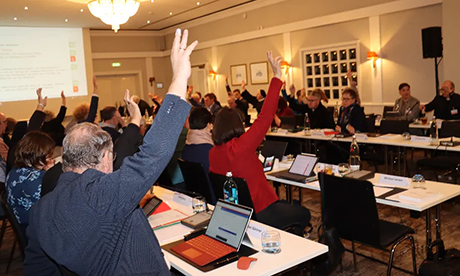The committee responsible for enacting the reforms proposed by the German Church’s “Synodal Path” has removed the requirement that two-thirds of Bishops must vote in favour of a decision for it to pass.
Previously for a vote to pass, two-thirds of bishops were required to vote in favour of a decision; now, it requires only two-thirds of all members (bishops and laypeople) for a vote to pass.
Convened to navigate changes following a crisis within the Catholic Church, the synodal way witnessed discussions on various topics. These included women deacons, priestly celibacy and greater lay involvement in selecting bishops.
Among the Synodal Way’s most controversial proposals was the creation of a synodal committee to ensure that resolutions are enacted in German dioceses to prepare the way for a permanent body called the “synodal council” in 2026.
Conversely, Vatican officials deemed it a structure surpassing the German bishops’ authority.
Despite objections, German Church leaders persist in advocating for this council. They assert it has features distinct from those critiqued by the Vatican.
However, disagreements persisted regarding the voting process, particularly concerning the bishops’ role and influence within the committee.
Advocates for change cited a need to modify the rules following a resolution addressing the Church’s approach to sexual ethics. This issue failed to garner the required two-thirds bishop majority.
Bishops can easily be outvoted
Notably, altering the voting regulations led to varied reactions. Some welcomed the adjustment, foreseeing increased efficiency and progress within the committee.
ZdK (Central Committee of German Catholics) leader Irme Stetter-Karp, who called for a change in the voting procedure after the synodal way ended in March, expressed her satisfaction after the two-thirds of Bishops rule was dropped.
“This committee, which I would like to respectfully call a real team, will be able to achieve a great deal for the future of the Church in Germany.”
On the other hand, critics expressed concerns about the potential marginalisation of the bishops’ authority. They claim it undermines their influence in decision-making.
Writing for the Catholic weekly newspaper Die Tagespost, the journalist Peter Winnemöller said: “A little basic arithmetic is enough to realise that with a maximum of 20 participating bishops, they can easily be outvoted even if all bishops disagree with a decision.”
However, German bishops’ conference Bishop Georg Bätzing sees the change as positive, commenting “The synodal committee has gained momentum. I am grateful that we have now entered a new phase” he said on 11 November.
“I am therefore happy to take up a phrase from the synod on synodality: Church on the move — we experienced this in Rome and also now in Essen.”
